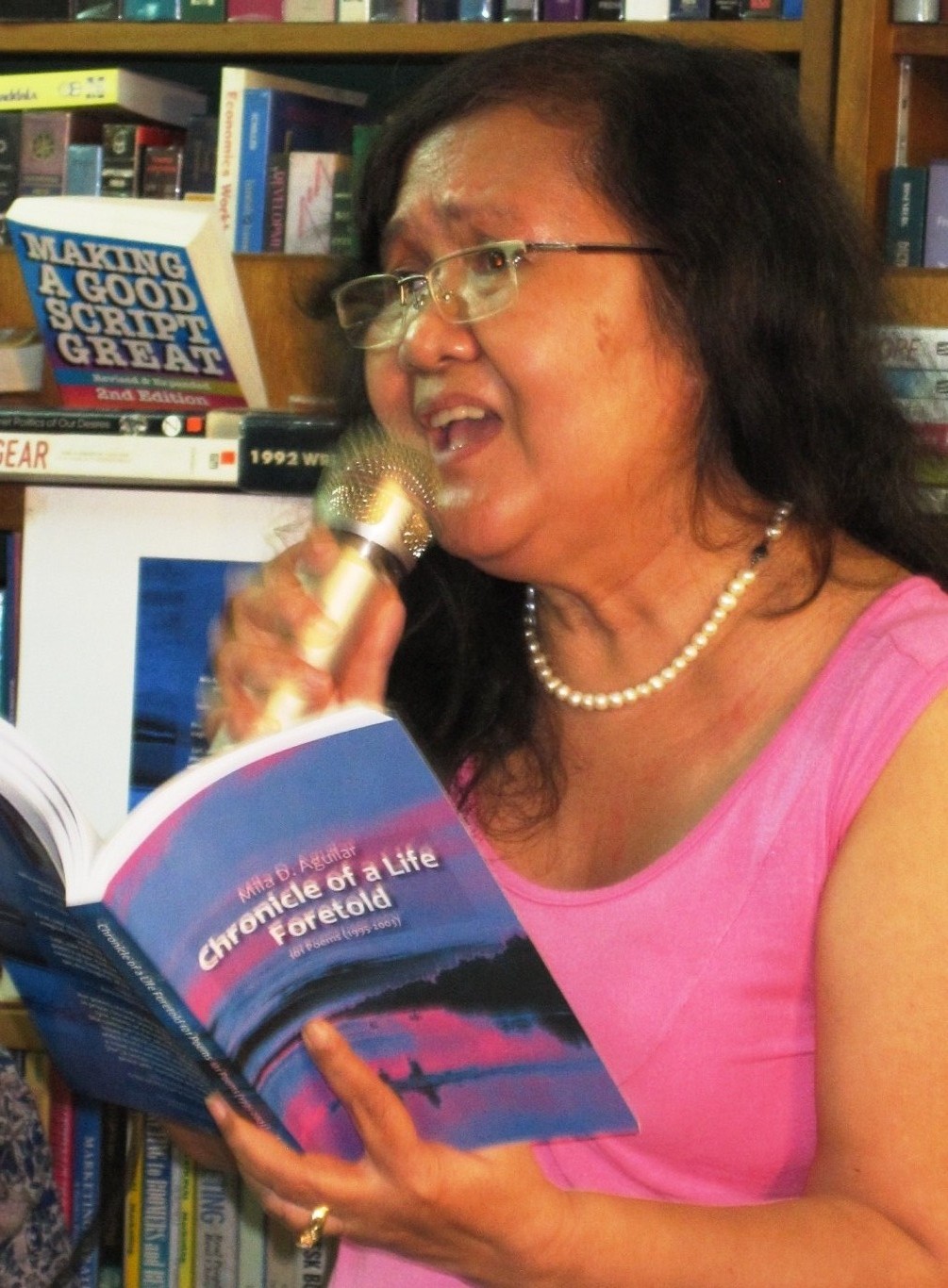Text and photos by ELIZABETH LOLARGA
HER books in the 1970s carried titles like Dare to Struggle, Dare to Win! and The Mass Line (A Second Remoulding), all written under her famous nom de guerre Clarita Roja.
The fact that poet Mila D. Aguilar listed the above in her latest collection of poetry, Chronicle of a Life Foretold: 101 Poems (1995-2003), as among her published works means she doesn’t shudder in denial that once she was a fierce activist who fought for radical change. The teacher in her will correct you that she still works for societal and spiritual change. The political is still personal to her.
Her book launching at Popular Bookstore on Timog and Morato avenues, Quezon City, was packed with aging activists who haven’t lost their fire and who recounted their time underground with Aguilar.
Carolina “Bobbie” Malay, one of the National Democratic Front representatives during the peace talks at the time of Cory Aquino’s administration, recalled how she was tasked to break the news to Aguilar’s aged mother that her youngest child had joined the movement. Mrs. Aguilar was in near hysterics and offered to assassinate dictator Ferdinand Marcos since she was old and had nothing more to lose so her daughter could surface and lead a normal life.
Brother Eddie Villanueva, former presidential candidate, said he had gone through personal changes not unlike what the poet went through–from a baptized Catholic to an agnostic activist imprisoned for his political beliefs then back to renewed spirituality. Like her, he saw how this society could improve its stature by being grounded in morality and a firm belief in God.
In her essay “Poetry as Faith and Prayer,” Lilia Quindoza-Santiago, poet, fictionist and literature professor, lauded Aguilar for treading “a territory that those in our generation would rather forego and leave unspoken. Were the activists in the seventies all atheists? The answer is certainly no. Many of us believed…many of us in the most solitary confines of the struggle whether in the fields or in prison stood by our faith. We knew how to pray and we learned to pray well. That was faith and there is that continuing faith now among many of us. We just don’t want to talk about it.”
She congratulated Aguilar for being a true poet by choosing “to shake us from our nonchalance.”
Theater director Behn Cervantes refused to share his memories of Aguilar which the guests at the launch did or sing a song the way Becky Abraham and daughter Astarte did. He stood up to read aloud a poem from the book that he said reminded him of Juan Ponce Enrile, one of the architects of martial law who unleashed the dogs of fascism on the movement. The poem “Do you not see the Devil” reads in part:
Do you not see the Devil
That he can be so handsome too
His mien so full of
Gentle grace…
Ah, but listen to the lies,
Listen to the lies
As he drones on and on…
I am afraid only the good
Can apprehend
The meanness of the mien.
I am afraid only the good
Who have their Christ in tow
Can see what it is
He means to do
With the power he has gotten
Through his graceful
Mien, through his gentle
Meanness.
Becoming a writer had been Aguilar’s dream. Her father, an educator, was her model. She said, “He made breakthroughs in mother-tongue-based multilingual education and the community school. He’s the father of both. By the time I was nine, he was already a Ramon Magsaysay awardee. In high school, I resolved to become a great writer. That must have arisen from my Core Class, which integrated reading, writing and social science in one teacher. But how does one become a great writer without a great cause? My father had my future tailor-made for me; his nation was the great cause.”
In college, Aguilar studied Dostoevsky, Faulkner and Hemingway, and found that one could not become a great writer “unless one is steeped in one’s culture and history. College was not enough. Even 13 years underground and one and a half years in prison were not enough. I had to do video documentaries all over the Philippines for a few years, then take Philippine Studies formally and informally as well.”
She said, “I finally got it. Without a vision, the people perish! That vision is God’s for the people of God, led by the children of God. Poetry is emotion expressed in unified rhythm, imagery and tension. What I cannot express of this vision in poetry, I must express in essay and story. Then pray that God will accept my paeans to Him, my plaints for and in behalf of my people.”
